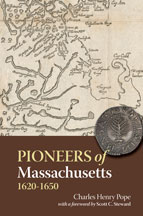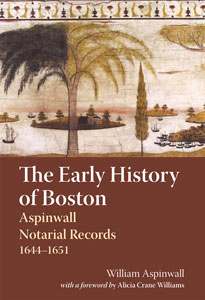 On Wednesday, we took a look at the books that are part of the Great Migration Study Project, which are key resources for genealogists and for people researching their own early New England ancestors. Just where did Robert Charles Anderson find the data to undertake his massive project? NEHGS Editor-in-Chief Scott C. Steward notes that Anderson “mined earlier published and unpublished compilations for lists of immigrants to New England, tirelessly cross-checking them against the surviving colony, county, town, church, probate, and deed record to create living portraits of seventeenth-century New Englanders.”
On Wednesday, we took a look at the books that are part of the Great Migration Study Project, which are key resources for genealogists and for people researching their own early New England ancestors. Just where did Robert Charles Anderson find the data to undertake his massive project? NEHGS Editor-in-Chief Scott C. Steward notes that Anderson “mined earlier published and unpublished compilations for lists of immigrants to New England, tirelessly cross-checking them against the surviving colony, county, town, church, probate, and deed record to create living portraits of seventeenth-century New Englanders.”
According to Steward, “One of [Anderson’s] primary resources has been Charles Henry Pope’s The Pioneers of Massachusetts, first published in Boston in 1900.” This book presents biographical information for nearly 6,000 pioneers who settled Massachusetts between 1620 and 1650 – and among other valuable elements, supplies aggregate data for occupations and social position. Steward believes that Pope’s work is invaluable to “anyone who has ever labored over which John Smith was which . . .”
 Another Great Migration resource is The Original Lists of Persons of Quality, 1600-1700. Written by John Camden Hotten and published in 1874, this is a compilation of documents listing seventeenth-century English immigrants to New England, the Chesapeake, and the Caribbean. According to Anderson, the records within were one of the most important sources utilized in his Great Migration work. He says, “In the course of more than two decades of research on that project, there have been frequent opportunities to check Hotten’s reading of these records against the original, with the result that the version published by Hotten has always been deemed to be accurate.”
Another Great Migration resource is The Original Lists of Persons of Quality, 1600-1700. Written by John Camden Hotten and published in 1874, this is a compilation of documents listing seventeenth-century English immigrants to New England, the Chesapeake, and the Caribbean. According to Anderson, the records within were one of the most important sources utilized in his Great Migration work. He says, “In the course of more than two decades of research on that project, there have been frequent opportunities to check Hotten’s reading of these records against the original, with the result that the version published by Hotten has always been deemed to be accurate.”
 For a somewhat different perspective, Anderson also consulted William Aspinwall’s The Early History of Boston: Aspinwall Notarial Records, 1644–1651. Aspinwall, who arrived with the Winthrop Fleet in 1630, was Recorder of the Suffolk County Court in Boston from November 1644 until October 1651. His careful records of every document he notarized – including letters of attorney, marriage contracts, and property and estate transactions – have proved to be a boon for genealogists. Alicia Crane Williams, lead genealogist of the Early New England Families Study Project, says, “Such things as letters of attorney, acknowledgments of receipts concerning estates in England, marriage contracts, and certificates provide some of the most interesting fodder. . . . For those whose ancestors are among Aspinwall’s clientele there can be important genealogical and biographical finds.”
For a somewhat different perspective, Anderson also consulted William Aspinwall’s The Early History of Boston: Aspinwall Notarial Records, 1644–1651. Aspinwall, who arrived with the Winthrop Fleet in 1630, was Recorder of the Suffolk County Court in Boston from November 1644 until October 1651. His careful records of every document he notarized – including letters of attorney, marriage contracts, and property and estate transactions – have proved to be a boon for genealogists. Alicia Crane Williams, lead genealogist of the Early New England Families Study Project, says, “Such things as letters of attorney, acknowledgments of receipts concerning estates in England, marriage contracts, and certificates provide some of the most interesting fodder. . . . For those whose ancestors are among Aspinwall’s clientele there can be important genealogical and biographical finds.”
These resources provide a great opportunity to go back to the original record (or closer to it). Anderson stresses the importance of this approach in his recently published Elements of Genealogical Analysis, which details his rigorous methodology for his Great Migration work.
Buy Aspinwall, for sure, as I intend to do. It is all original material, providing information on people/locations who have either not been researched or not properly understood in terms of their migratory relationships (as either Alicia, Scott and even RCA have noted). The experience of working from original materials is developmentally exciting–you can be a better historian/genealogist for doing so.
Buy Hotten if you’d like. Truly pioneering, but limited and so not inclusive. The actual first edition book in near to 1st state is a treasure–beautifully designed and very well built. Except for those years that RCA has not gotten to, the Society’s GM books (& RCA’s dedicated research & the Society’s dedicated support of that research) are vastly superior in terms of other migratory sources. In terms of situating that information in the particular and general context, they are what makes RCA an historian and Hotten an antiquarian.
But Pope? Without annotating every entry? I could play a drinking game the first 3 GM books, taking a swig every time RCA notes some Pope entry, whole or in part, that is somehow incorrect or just plain wrong. I don’t think I’d make it to the end of those 3 volumes without being well to the wind. How much original research Pope himself did is, I suspect, pretty low, and his quality control supervision over his researchers was not what it should have been. I cite the John Lake entry and the abstracted abstract of his will and how that effects understanding the Lake-Coy relationships. I’ve stumbled over many more. There is a reason why no one should consult Pope’s Pioneers of Maine and New Hampshire over going directly to Noyes, et. al., Gen. Dict. of ME & NH. It was inadequate to begin with and full of actual errors and interpretative misconceptions. Its best result was in stimulating Davis to get the latter project going. Please, leave P. of Mass. on the shelf for consultation only when absolutely necessary.
Thanks for the loan of the soapbox. Keep up the Good Work.